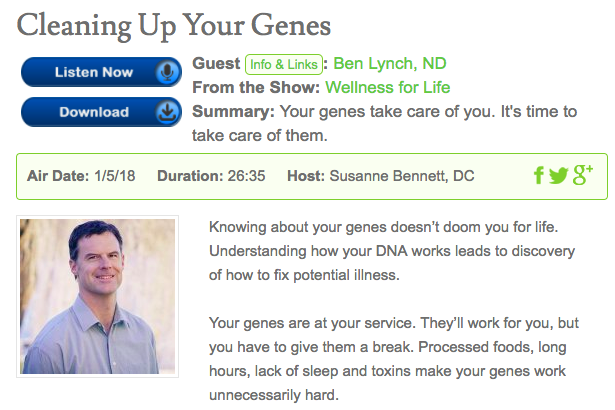Cleaning Up Your Genes
I was in an intense conference call with my agent and my writer.
We were discussing what to call my future book.
The title they really wanted was ‘The 7 Deadly Genes.”
Ugh.
No!
I wasn’t being clear with what I intended to write.
I wanted:
- empowering
- insightful
- truly wholistic.
This was the phone call where I had to make myself clear and get the book name clear.
As I was discussing it, my writer, Rachel, blurted out the phrase . . . .she full on interrupted me.
“Dirty Genes”
“What was that?” I asked.
“Dirty Genes.” she said calmly.
I knew that was it!
And that is where Dirty Genes was born!
I absolutely LOVE the concept.
What is a Dirty Gene?
I asked folks yesterday during a Live interview and this is how they defined a ‘dirty gene’:
- ‘A dirty gene is a gene whose function is impaired either because you’re born with mutations or because their function is altered by mindset, diet and lifestyle choices, and environmental contaminants’
- ‘When you’re born with a bunch of dirty SNP’s, you need to take greater efforts toward health through lifestyle, diet, stress, mindset and toxin choices.’
- ‘Dirty Genes are genes that are inhibited from working as optimally as they should be, in our biochemical pathways, because they are lacking the proper enzyme or cofactor to function at their best, or are being adversely impacted by other environmental factors that impair their function.’
- ‘What makes a non-mutated gene “dirty” is when its normal healthy function is inhibited by nutritional deficiencies, environmental toxins, stress, etc. or some combination thereof.
- ‘A dirty gene is born dirty via a SNP or becomes dirty from exposure to mold, chemicals or infection, The dirt impacts the ability of the gene to function properly.’
- ‘A dirty gene is a gene that needs a Soak and Scrub’
And – my favorite definition of a Dirty Gene – as it is so clear and concise:
Dirty Gene: A gene that doesn’t work optimally
What happens when a gene gets dirty?
- It cannot function
- Since it cannot function, work doesn’t get done.
- Minor symptoms start happening.
- Another gene or two or twenty get called in to help out since the one gene cannot get its job done.
- Those genes get overworked and tired.
- They start getting dirty.
- More and more random symptoms start happening – think chronic disease.
- Other genes step up as the others get tired. These other genes are not pleased about it and make noise.
- Major symptoms start happening – think emergent care.
Better to identify the dirt early and remove it, right?
- How can you if you don’t know what the dirt is?
- How can you if you don’t know which symptoms link to which genes?
- How can you if you don’t know what these genes do, how they want to work and how they get dirty?
A gene (and the enzyme it makes) does not work optimally IF:
- lacking vitamins and minerals to help activate the enzyme it produces
- contains a variant/SNP which affects its shape which then affects its ability to perform a function
- blocked by something – such as heavy metals, infections, chemicals, other hormones
- does not have enough material to build with – such as lacking protein (methionine, tyrosine, tryptophan)
- has too much material which inundates it – such as folic acid, methionine
- and more (discussed fully in Dirty Genes)
What is Dirty Genes, your book, about?
Great question.
The best way to describe this is to listen to this fantastic interview by Dr. Susanne Bennett.
Run time is only 26 minutes – and very worth it!
You may also access it by going to her website directly:
This begs the question…. “Is genetic testing worthless?”
Far from.
Genetic testing and the reports can be a distraction though from the fundamentals. You have to make sure you clean your dirty genes FIRST before you start focusing on SNPs and genetic results.
This individual says it best:
‘I don’t think he is saying it is NOT the genes; I think he is saying mutated genes are a contributing factor (hence, we have to work HARDER to stay healthy), and the more mutations we have, the greater the impact. Am I incorrect, Dr. Ben?’
That is correct.
If you have a bunch of SNPs, they absolutely contribute to your susceptibility to symptoms and disease. My point is no matter what, you have to work to keep your genes clean – especially if they are born dirty they are easier to get dirtier.
Dive deeper into what a Dirty Gene is and what YOU can DO
The Dirty Genes Summit starts Jan 22 and runs till Jan 29!
Learn from 50 presenters!
Delivered by all quality audio so you can listen from your phone, in your car – and not have to sit facing your computer stuck to your chair!
Here are the topics offered at the Dirty Genes Summit
- Mindset
- ADHD
- Lyme
- Cancer
- Autism
- Pregnancy
- Parkinson’s
- Genetic testing
- Organic acid testing
- Genetic testing reports
- Gut health testing
- Histamine intolerance
- Exercise
- Breathing
- Sleep
- Hormones
- Fatty liver
- Detoxification
- Food
- Vaccines
- Gluten
- Thyroid
- Adrenals
- Healthcare
- Dementia
- Alzheimers
- Digestion
- Hunting
- Special needs
- Down syndrome
- Skincare
- Efficiency
- Color
- Blood sugar
- EMF
- Microbiome
- Purpose
I can’t stop there.
When you reserve your spot, I also give you my 26 Steps to Clean Genes Bonus Chapter – immediate access to everyone (including you!)
I’m off to interview one of the presenters here now – so gotta go!
Go and secure your spot – this is a not miss event!
You’ll be seeing all the buzz going on here really soon!
 800-470-7401
800-470-7401

